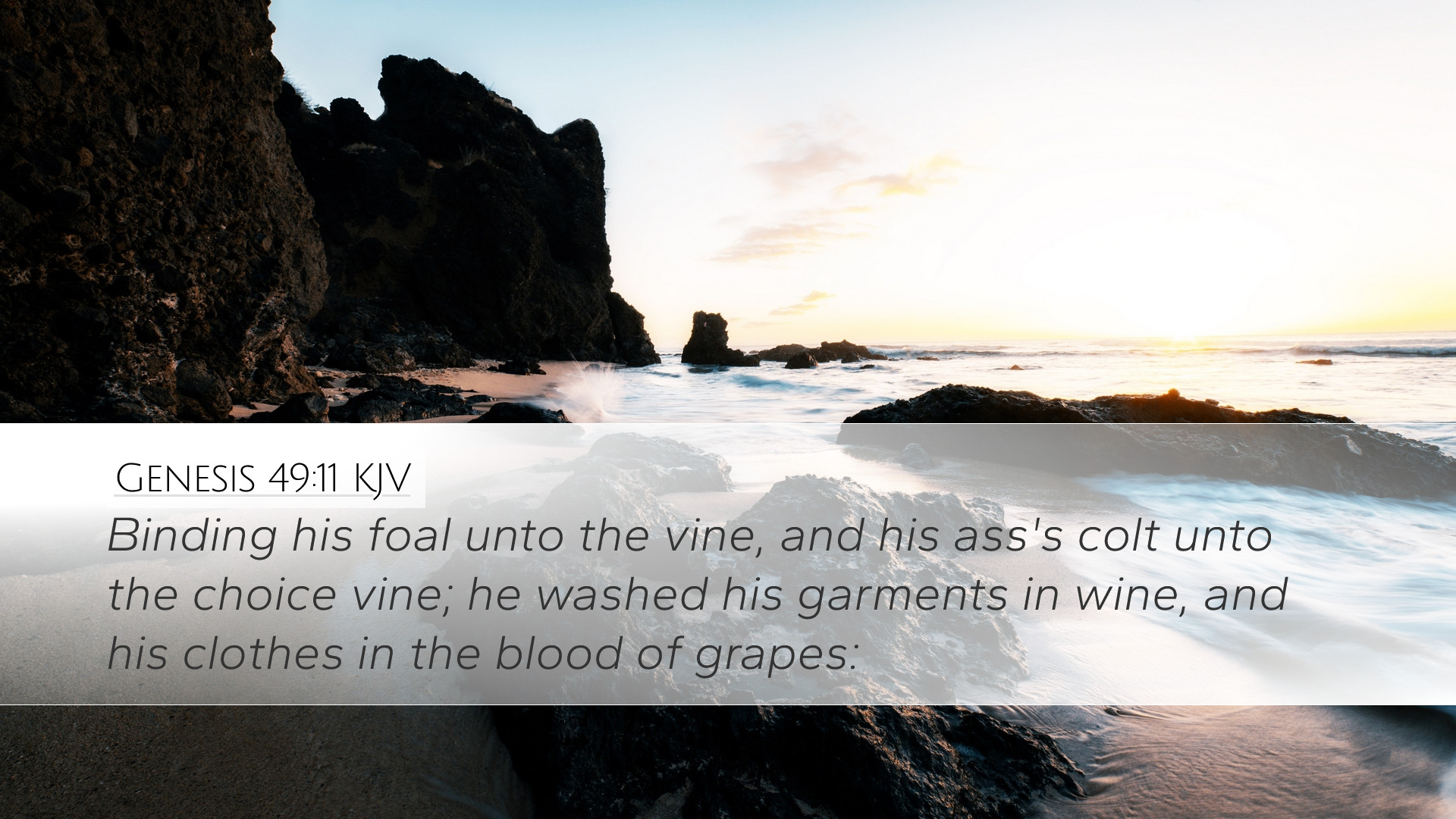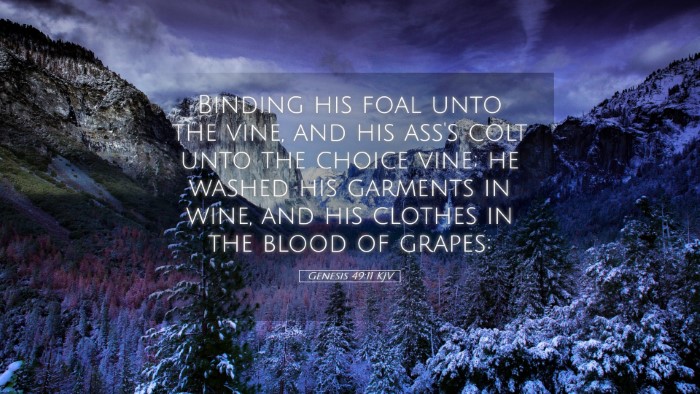Commentary on Genesis 49:11
Verse: "Binding his foal unto the vine, and his ass's colt unto the choice vine; he washed his garments in wine, and his clothes in the blood of grapes."
Introduction
This verse is part of Jacob's prophetic blessings to his sons, found in Genesis 49, where he speaks to each son regarding their future and the destiny of their descendants. Genesis 49:11 is particularly rich in imagery and symbolism, signaling the character and future of Judah, from whom the kingship and ultimately the Messiah would come.
Contextual Background
Jacob, at the end of his life, gathers his sons to bless them, providing not only immediate insights into their characters but prophetic foresight into the futures of the tribes they represent. The focus on Judah in verses 8-12 highlights the significance of this tribe in God’s redemptive plan.
Analysis of Key Phrases
1. “Binding his foal unto the vine”
This imagery suggests a time of abundance and peace where even the young donkey is tied to a vine, indicating prosperity. The vine is symbolic of blessing and fertility in Scripture (cf. Isaiah 5:1).
Matthew Henry observes that the vine is a source of joy and that such a binding demonstrates the peaceful coexistence of the blessings Judah will enjoy.
2. “His ass’s colt unto the choice vine”
The “ass’s colt” may signify humility and service. According to Albert Barnes, the use of a young donkey underscores the peaceful reign that Judah will usher in, in contrast to a war horse, which symbolizes conflict.
Adam Clarke notes that the choice vine emphasizes the fruitfulness of Judah’s lineage, as it points toward the coming of Christ, who would enter Jerusalem humbly on a donkey.
3. “He washed his garments in wine”
This phrase presents a striking image of abundance, suggesting that Judah will experience such richness that wine, often associated with joy and celebration in the Bible, becomes a way to wash garments. This can denote purity and anointing, signifying celebration and divine blessing (cf. Deuteronomy 7:13).
Henry indicates that this reflects the joy and fertility of the land, which is predominantly tied to Judah's expected prosperity. The washing in wine might symbolize how even the mundane becomes significant in a blessed context.
4. “And his clothes in the blood of grapes”
This figurative expression can be interpreted as bearing a dual meaning. Firstly, it reflects the abundance of the harvest in Judah's territory. Secondly, it may allude to the sacrificial aspect, hinting toward the ultimate sacrifice of Christ and the redemption of mankind through His blood.
Barnes elucidates this by recognizing that the spilling of wine is akin to the spilling of blood, pointing toward the future Messiah who is often referred to in terms of wine (John 15:1). Adam Clarke draws correlations between this imagery and the sacrificial system that would be later instituted.
Theological Implications
This verse powerfully encapsulates the messianic prophecy associated with Judah. Throughout biblical history, Judah’s descendants including David and ultimately Jesus Christ reign from this lineage, fulfilling the promise that the scepter shall not depart from Judah (Genesis 49:10).
Royalty and Leadership: Judah's royal status can be traced back to this prophetic declaration, crucial for understanding Israel's monarchy and the line of the Messiah. The theme of leadership emerging from Judah ties into the broader narrative of God's redemptive plan for His people.
Symbolism of Wine: The imagery in this verse has been frequently revisited in both the Old and New Testaments, where wine becomes a metaphor for joy, blessing, and ultimately, the blood of Christ. This helps shape Christian eschatological views, where the ‘marriage supper of the Lamb’ invites believers to partake in the ultimate joy (Revelation 19:9).
Practical Applications
This passage offers significant insights for pastors and theologians in various realms of life:
Community and Blessing: The abundance suggested in this passage encourages communities to foster environments of peace and celebration, mirroring the joys of life in Christ.
Messianic Expectation: Understanding the roots of Jesus within the tribe of Judah enriches the Christian’s comprehension of the Old Testament's fulfillment in the New Testament, making it a vital teaching point for discipleship.
Symbolism in Worship: The metaphor of wine and garments challenges leaders to consider symbolism in worship settings, where the richness of worship can reflect divine abundance.
Conclusion
Genesis 49:11 is a prophetic decree filled with layers of meaning, relating to Judah's future, the nature of Christ's kingship, and the abundant blessings available to those who follow God. By examining the insights from Matthew Henry, Albert Barnes, and Adam Clarke, we uncover the theological and practical ramifications of this verse, enabling a deeper understanding of Scripture that resonates through both history and contemporary faith.


